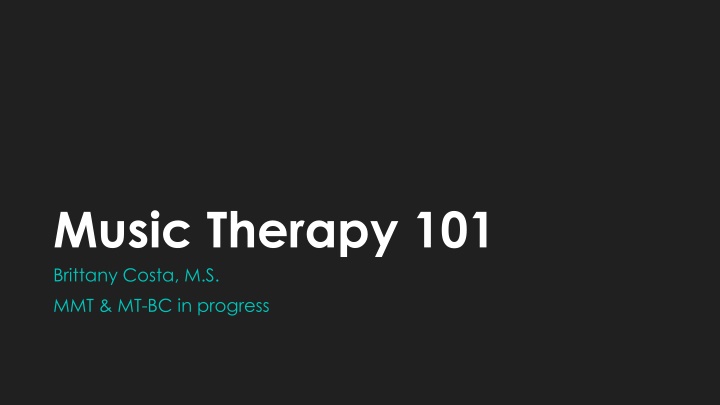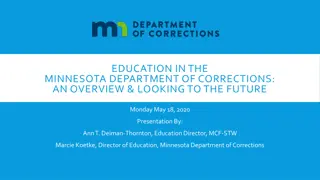
Music Therapy: Benefits, Practices, and Future Outlook
Explore the world of music therapy with insights on its definition, methods, settings, and benefits for individuals of all ages and backgrounds. Discover how music therapy can positively impact your life and the qualifications needed to pursue a career in this field.
Download Presentation

Please find below an Image/Link to download the presentation.
The content on the website is provided AS IS for your information and personal use only. It may not be sold, licensed, or shared on other websites without obtaining consent from the author. If you encounter any issues during the download, it is possible that the publisher has removed the file from their server.
You are allowed to download the files provided on this website for personal or commercial use, subject to the condition that they are used lawfully. All files are the property of their respective owners.
The content on the website is provided AS IS for your information and personal use only. It may not be sold, licensed, or shared on other websites without obtaining consent from the author.
E N D
Presentation Transcript
Music Therapy 101 Brittany Costa, M.S. MMT & MT-BC in progress
Your Presenter A little about me
Questions to be Answered What is music therapy? Where do music therapists work? Who can benefit from music therapy? What is a typical music therapy session like? What do you see the future of music therapy is? What type of education do you need to become a music therapist? Do you need to be a musician or play an instrument? How can you use music therapy in your day-to-day life?
What is Music Therapy? Difficult to define Considered an early practice, still in development American Music Therapy Association (AMTA) definition: Music Therapy is the clinical and evidence-based use of music interventions to accomplish individualized goals within a therapeutic relationship by a credentialed professional who has completed an approved music therapy program. Ken Bruscia definition: Music therapy is a reflexive process wherein the therapist helps the client to optimize the client s health, using various facets of music experience and the relationships formed through them as the impetus for change. As defined here, music therapy is the professional practice component of the discipline, which informs and is informed by theory and research. Bruscia, 2014 AMTA, 2021
Two components: Music Therapy Four methods: What is Music Therapy? Creative Re-creative Receptive Improvisation Biopsychosocial Can impact clients in many ways including biologically, psychologically, and socially (I would even say spiritually)
Where do Music Therapists Work? Hospitals Schools Senior Homes Prisons VA Private Practice Facilities Private Homes Community Centers
Who Can Benefit from Music Therapy? EVERYONE
Introduction, establish a routine (Hello song) What is a Typical Music Therapy Session Like? Verbal discussion Corps intervention(s) Potentially debrief Outro/end of session
With COVID, more accessibility through telehealth As a practice in its infancy, we are going to continue to watch the field grow What Do You See in the Future of Music Therapy? More research and evidence to validate the work Gain more attention as an alternative therapy Widespread covered under health insurance More schools of thought may emerge (theory)
What Type of Education Do You Need to Become a Music Therapist? In the US, you re required to have a minimum of a bachelor degree in music therapy, followed by passing the CBMT exam to become certified. You can also go through an equivalency program followed by the CBMT. In other countries music therapy is a mater-level entry field.
Do You Need to be a Musician or Play an Instrument? Yes, mainly guitar, piano, voice, and percussion
How Can You Use Music Therapy in Your Day-to-day Life? Relaxation Connect with self Achieve optimal wellness De-stressing Grounding/centering/becoming present Isoprinciple
References American Music Therapy Association. What is Music Therapy | What is Music Therapy? | American Music Therapy Association (AMTA). (2021). https://www.musictherapy.org/about/musictherapy/. Bruscia, K. E. (2014). Defining music therapy. Barcelona Publishers.


